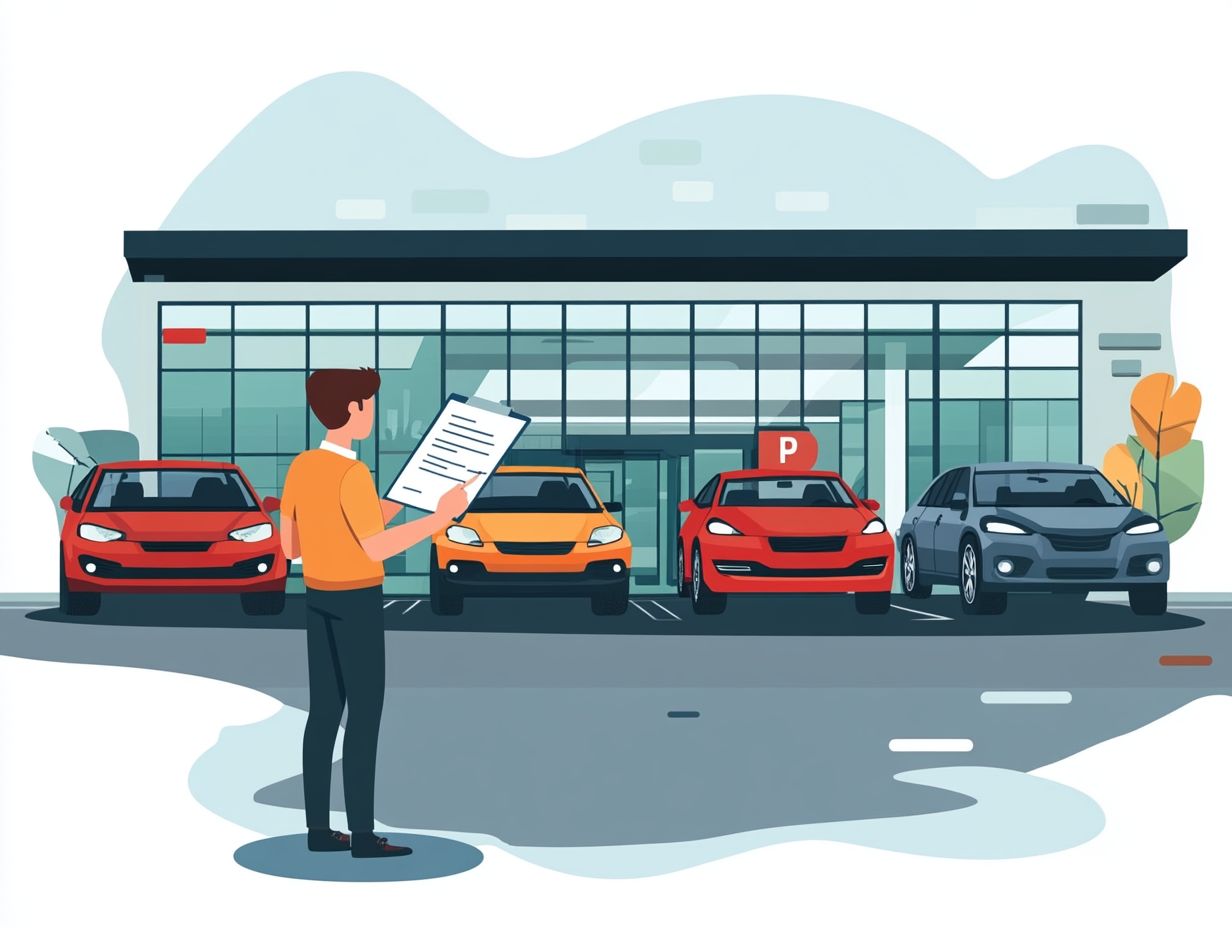How to Prepare for a Used Car Purchase
Purchasing a used car can evoke a blend of excitement and apprehension. With a multitude of options at your fingertips, mastering the navigation of this process is crucial for making a savvy investment. Get ready to drive away with confidence and a smile on your face!
This guide delves into essential considerations, from establishing a realistic budget to selecting the ideal type of vehicle, examining key features, and negotiating the best price. It also sheds light on financing options and the requisite paperwork needed to finalize your purchase.
Contents
- Key Takeaways:
- Researching Used Cars
- Setting a Budget
- Choosing the Right Type of Used Car
- Inspecting a Used Car
- Negotiating the Price
- Obtaining Financing
- Completing the Purchase
- Frequently Asked Questions
- What are the benefits of preparing for a used car purchase?
- What are the important factors to consider when preparing for a used car purchase?
- How can I research the best car for my needs?
- What should I look for in a car’s history and condition?
- How can I negotiate a fair price for a used car?
- Should I consider financing options for a used car?
Key Takeaways:

Research is key: Take the time to research different makes and models, as well as factors such as reliability and resale value, before making a used car purchase.
Set a realistic budget: Consider all expenses, including maintenance and insurance, when determining how much you can afford for a used car. Stick to your budget to avoid financial strain.
Don’t overlook key features: When choosing a used car, consider important aspects like safety and fuel efficiency.
Researching Used Cars
Researching used cars is an essential first step in your car-buying journey. This process helps you make informed decisions. It involves diving into a vehicle’s history, including previous ownership, accident records, and any safety defects.
By tapping into resources like the National Highway Traffic Safety Administration (NHTSA) and reputable vehicle history reports from companies such as Carfax and AutoCheck, you can uncover crucial details that could significantly influence your purchase. It’s also wise to be aware of complaint histories and check for any recalls linked to the vehicle you’re considering, particularly when dealing with licensed dealerships.
Factors to Consider
When considering the purchase of a used car, it’s essential to evaluate several critical factors, including negotiation tips for used car buyers, to ensure you make a wise investment.
Understanding the total cost of ownership, which includes not just the price of the car but also costs like insurance and repairs, will help you gauge your budget effectively. You’ll want to assess key components such as mileage and engine condition. Don t hesitate to inquire about any existing warranty to protect yourself against unexpected expenses.
Evaluating market value is crucial, as it reflects the current worth of the vehicle and helps you avoid the trap of overpaying. A thorough repair history can be a treasure trove of insight, revealing past issues and identifying any red flags that might make you think twice.
Financial counselors offer valuable guidance during this process, ensuring you re not just ready for the purchase but also equipped for the ongoing costs of car ownership.
Understanding a vehicle’s mileage can be a telling indicator of its potential longevity. Higher mileage often suggests greater wear and tear. Comprehensive warranty options can offer you peace of mind, guarding against those costly repairs that inevitably come up down the road.
Setting a Budget
Establishing a budget for purchasing a used car is a crucial step that demands thoughtful consideration of various financial factors to prevent overspending. This process entails estimating the total cost of ownership, which encompasses not only the car s purchase price but also potential financing options, insurance premiums, dealership fees, and expenses tied to ownership transfer.
By securing loan preapproval, you can gain a clearer perspective on your financing options, equipping yourself for more effective negotiations with dealerships.
Now that you’re equipped with the right information, start your research today and find the car that suits you best!
Determining How Much You Can Afford
Determining how much you can afford when purchasing a used car is crucial for good money management and ensuring satisfaction with your investment. To enhance your buying experience, consider these tips for buying used cars at auctions.
To accurately gauge your affordability, it s wise to create a detailed budget that includes all costs associated with the vehicle, such as financing, insurance, and maintenance.
A financial advisor gives personalized advice and helps secure loan preapproval. This enables you to enter the dealership with a clear understanding of your financial boundaries.
Having a precise budget not only helps you avoid overspending but also clarifies which types of vehicles are truly within your reach.
Financial counselors can highlight often-overlooked expenses like registration fees and dealership add-ons, which can significantly affect your overall cost.
Securing loan preapproval is essential, as it enhances your purchasing power and gives you leverage during negotiations.
Sellers tend to be more cooperative when they see a buyer is financially prepared. Being financially prepared strengthens your position and instills confidence, turning the car-buying journey into a more straightforward and enjoyable experience.
Choosing the Right Type of Used Car

Finding the perfect car can be an exhilarating journey! Selecting the right type of used car is a crucial decision that can greatly elevate your buying experience and overall satisfaction.
As a potential buyer, it’s essential to explore various options and features that resonate with your preferences. Consider factors like model type, fuel efficiency, and any enticing add-ons.
Opting for certified pre-owned vehicles used cars that have undergone thorough inspections and come with warranties can provide extra peace of mind.
Additionally, checking safety ratings and reviews from reputable sources will enable you to make well-informed choices.
Options and Features to Look For
When you re selecting a used car, it s crucial to explore a range of options and features to ensure it aligns perfectly with your lifestyle needs.
Consider important factors such as certified pre-owned status, safety ratings, technology advancements, and fuel efficiency. These elements are important in making a smart investment that truly fits your requirements.
Assess whether the vehicle boasts desirable features, like modern safety features or infotainment options, to enhance your driving experience.
In today s market, certified pre-owned vehicles present a great balance between affordability and reliability, often accompanied by extended warranties and thorough inspections.
Safety ratings are especially vital for families, as higher-rated vehicles not only provide peace of mind but may also lead to lower insurance premiums.
With technology evolving quickly, features such as adaptive cruise control, lane-keeping assist, and smartphone integration have become essential components.
Therefore, it s crucial for you to prioritize these advancements based on your unique needs, ensuring that the vehicle you choose enhances your driving experience and aligns seamlessly with your lifestyle and safety expectations.
Inspecting a Used Car
Inspecting a used car before making a purchase is a vital step that can reveal potential issues and confirm the vehicle’s reliability. Additionally, it’s important to know what to avoid in a used car deal to ensure a wise investment.
This thorough process should include a detailed mechanic inspection to evaluate critical components like engine condition, safety defects, and the accuracy of the odometer reading.
Diving into the vehicle’s history including previous repairs and maintenance records will enable you to make informed decisions and help you avoid hidden costs in the future.
Important Areas to Check
When inspecting a used car, focus on key areas to ensure its condition and performance. Start with the engine listen for any unusual noises or signs of oil leaks. These could signal serious issues.
Next, check the odometer. Validate the mileage with service records to confirm that the car hasn t been tampered with. This will give you a clearer picture of the vehicle’s wear and tear.
Examine safety features like airbags and seat belts. Make sure they function properly. When you check the exterior, look for uneven paint or rust, which can hint at past accidents.
Finally, assess the tires and brakes. They are important for safe driving.
Considering these factors will give you important insights. You’ll be better prepared to make a smart investment by following tips for researching used car prices when buying a used vehicle.
Negotiating the Price
Negotiating the price of a used car is essential. It can save you money and help secure a fair deal.
Research the market value of the vehicle. Consider its condition, mileage, and any complaints linked to the dealership.
Prepare for negotiations by understanding contract terms and dealer fees. Have a clear idea of what a reasonable offer is based on the vehicle’s overall value.
Tips for Getting a Good Deal

To secure a good deal, approach negotiations with confidence and preparation.
Conduct market research to find the average price for similar vehicles. This helps you make informed offers.
Start by checking online resources and local listings to gauge prices. This establishes a baseline and helps identify inflated values.
When making your first offer, consider starting lower than your target price. This creates room for bargaining.
Maintain your composure during discussions. Don t let emotions take over, as this can weaken your negotiating position.
Always read contracts thoroughly before finalizing any deal. Ask questions about hidden fees to avoid surprises.
Obtaining Financing
Securing financing for a used car is a vital step. It requires thoughtful planning and exploring various options.
Get loan preapproval from reputable lenders. This establishes a budget that reflects the total cost of ownership, including insurance and maintenance.
This proactive approach improves your buying experience. It also enables better negotiation at the dealership.
Options and Requirements
When financing a used car, you need to understand your options and requirements well. Explore bank loans, credit unions, and dealership financing. Keep in mind prerequisites like your credit score and income verification.
Loan preapproval can streamline the process. It provides clarity on financing terms so you can choose the best option for your situation.
Understanding financing can significantly enhance your purchasing experience. You might find that credit unions offer lower interest rates than traditional banks.
Your credit score is important it often leads to better loan terms. To improve your score, pay down existing debts and make timely payments.
With loan preapproval, you ll have a clearer budget. This boosts your confidence in negotiations and can save you time and money.
Completing the Purchase
Completing the purchase of a used car requires essential steps that ensure a smooth ownership transfer and comply with legal obligations, similar to what to expect during your new car purchase.
Begin with a thorough review of the contract to understand the sale terms, including dealership fees and warranties. You must ensure that all paperwork for the title transfer is complete.
Attention to detail is crucial for establishing legal ownership. It also helps safeguard against future disputes.
Paperwork and Final Steps
The paperwork and final steps in purchasing a used car are vital for securing a legally binding transaction. You need to complete the title transfer and registration forms.
Take the time to review the contract to understand dealership fees and any additional costs. Accurately filling out and submitting all documentation protects your interests.
This paves the way for a smooth experience. Focusing on the title transfer is especially important, as it signifies the official change of ownership.
This process provides peace of mind that the vehicle is free from liens. Registration ensures your vehicle is legally recognized for use on public roads.
Don’t overlook the importance of a thorough contract review. This step helps you spot potential hidden fees or unclear terms.
By scrutinizing these documents before you sign, you can avoid unexpected financial burdens and ensure clarity regarding the sale conditions.
Frequently Asked Questions

What are the benefits of preparing for a used car purchase?
Preparing for a used car purchase can save you time, money, and stress. After making your purchase, knowing what to do after buying a used car helps ensure you get the best car for your needs and negotiate a fair price.
What are the important factors to consider when preparing for a used car purchase?
Consider your budget, the type of car you need, the car’s history and condition, and the seller’s reputation. Additionally, be sure to explore how to research used cars effectively, and think about your financing options and getting a pre-purchase inspection.
How can I research the best car for my needs?
You can research by reading reviews from reputable sources and comparing prices and features. Don’t forget to consider fuel efficiency, safety ratings, and maintenance costs.
What should I look for in a car’s history and condition?
Check the car’s history report for any accidents or major repairs. Inspect the car’s exterior and interior for damage, and take it for a test drive to check for mechanical issues.
How can I negotiate a fair price for a used car?
Research the car’s market value and know your budget. Be prepared to walk away if the seller won t negotiate. Coming with a list of potential issues can also help.
Should I consider financing options for a used car?
Yes, consider your financing options when preparing for a used car purchase. This includes getting pre-approved for a loan or exploring dealership financing, as well as understanding what to expect during a used car inspection.
Carefully review the terms and interest rates to ensure they fit your budget.






